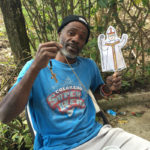
A colleague shared a short, powerful video, “The Holocaust twin who forgave the Nazis,” that all of us would benefit from watching and taking to heart. More than ever, we need the healing power of forgiveness so movingly conveyed in the first-person account of Eva Mozes Kor that begins with the Holocaust and ends with her letter to a former Nazi doctor decades later.
In 1944, 10-year-old Eva and her identical twin, Miriam, were yanked from the arms of their mother on the train platform at Auschwitz concentration camp and taken away. “I remember looking back at my mother. I did not know at that time, but I would never see her again,” Eva recalls in the video made by Panda Studio (https://tinyurl.com/n6n83fu6).
The twins endured humiliating examinations and life-threatening medical experiments. An injection caused Eva to become so ill that she nearly died. She fought tenaciously to live, and did. She and her twin survived Auschwitz, among just 200 survivors of the 3,000 individual twins subjected to Nazi experiments (thestoryofeva.com). When Eva and Miriam returned home to Romania, they discovered no one else in their family had survived.
Years later, Eva, living in the United States, became a vocal, nationally known activist for Holocaust survivors. However, when Miriam died in 1993 after suffering health challenges attributed to the medical experiments, Eva sank into deep anger over her loss.
Eventually, she traveled to Germany to meet a former Nazi doctor who deeply regretted his role in the Holocaust. He treated Eva with kindness and respect and agreed to travel with her to Auschwitz to admit to his culpability.
She felt moved to thank him, but spent 10 months wrestling with how to do so before choosing to send him a letter of forgiveness.
“I knew that that was a meaningful gift for him,” she says in the video, “But what I discovered for myself was life-changing. That I had the power to forgive. No one could give me that power. No one could take it away.” She also forgave Dr. Josef Mengele, the so-called “Angel of Death” who selected prisoners for execution in the gas chambers and conducted inhumane experiments on the prisoners.
Eva chose to release herself from the chains of sadness, anger, hopelessness and helplessness she felt because of the cruelty she suffered at the hands of others. “You can never change what happened in the past. All you can do is change how you react to it. My sister and I were made into human guinea pigs. Our whole family was murdered. But I have the power to forgive. And so do you,” she says at the video’s end.
All of us have experienced the need to forgive and to be forgiven; it is part of being human and a reminder of our brokenness that we mend with God’s grace. Pope Francis speaks often and eloquently about the power of forgiveness and the need for mercy toward others and ourselves.
In his encyclical, “Fratelli Tuti” (on Fraternity and Social Friendship), Pope Francis said those who truly forgive do not forget. “Instead, they choose not to yield to the same destructive force that caused them so much suffering.” He said, “Forgiveness is precisely what enables us to pursue justice without falling into a spiral of revenge or the injustice of forgetting.” You can read the encyclical on the Vatican website (https://tinyurl.com/bd7c8tw4).
We must never forget the Shoah (Holocaust), nor the atomic bombs dropped on Hiroshima and Nagasaki, for example, the Holy Father said. “We need to ‘keep alive the flame of collective conscience, bearing witness to succeeding generations to the horror of what happened,’ because that witness ‘awakens and preserves the memory of the victims, so that the conscience of humanity may rise up in the face of every desire for dominance and destruction.’”
The victims — individuals, social groups or nations — must never forget, “lest they succumb to the mindset that leads to justifying reprisals and every kind of violence in the name of the great evil endured.” The Holy Father also calls us to remember those who suffered inhumanity but retained their dignity and chose the part of solidarity, forgiveness and fraternity.
You can read further about his thoughts on forgiveness in a new book titled “The Power of Forgiveness, Pope Francis on Reconciliation,” available on the U.S. Conference of Catholic Bishops’ website (https://tinyurl.com/s6sbr283).
“A common assumption about forgiveness is that it is excusing, ignoring, etc., but it is letting go of the anger, and the pain that we carry around,” says Mara Adams, a theology professor at St. Ambrose University in Davenport.
“Forgiving is something we do for ourselves, and it can be a gift we offer to others. Even when the offender is not around to receive it or is recalcitrant in their refusal to ask for/accept forgiveness, we can still offer it. While I believe that the purpose of forgiveness is to heal relationships, healing and reconciling is not always possible, and sometimes, not psychologically healthy.”
These insights on forgiveness take on flesh in the stories of people like Eva Mozes Kor, who died in 2019 during production of the video. Let us all put into action her advice: “But I have the power to forgive. And so do you.”
Barb Arland-Fye
arland-fye@davenportdiocese.org











